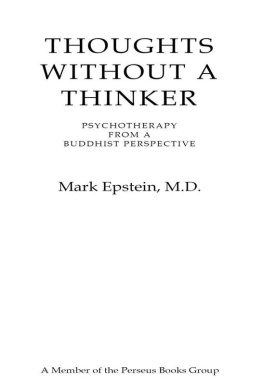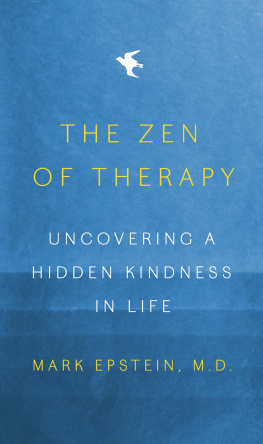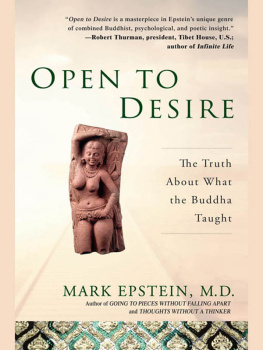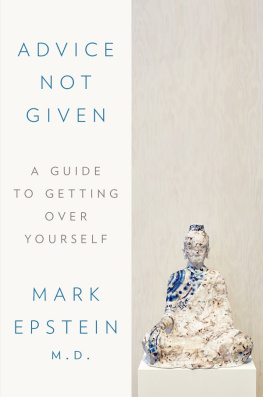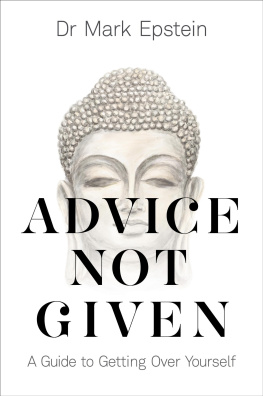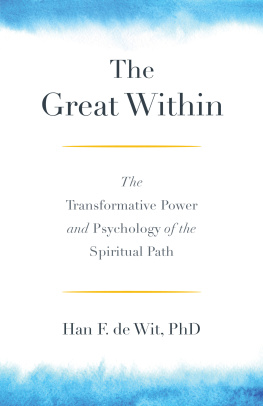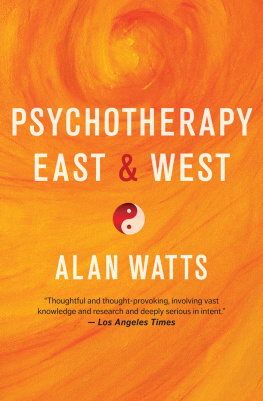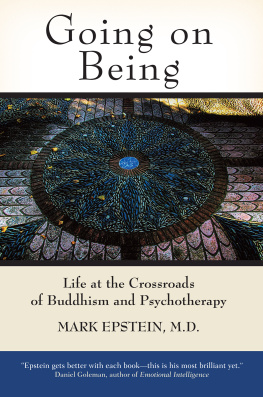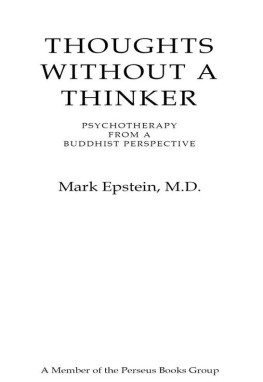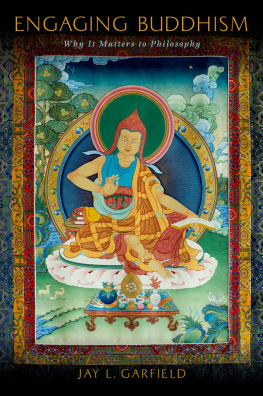Also by Mark Epstein, M.D.
THOUGHTS WITHOUT A THINKER
PSYCHOTHERAPY FROM A BUDDHIST PERSPECTIVE
Mark Epstein, M.D.
A Member of the Perseus Books Group
Parts of chapter 5 previously appeared in different form in Tricycle: The Buddhist Review as Freud and Dr. Buddha: In Search of Selflessness, Tricycle 1, no. 3 (spring 1992).
Copyright 1995 by Mark Epstein, M.D.
Published by Basic Books, A Member of the Perseus Books Group
Hardcover edition first published in 1995 by Basic Books
Paperback edition first published in 1996 by Basic Books
All rights reserved. No part of this book may be reproduced in any manner whatsoever without writ-ten permission except in the case of brief quotations embodied in crit-ical articles and reviews. For information, address Basic Books, 387 Park Avenue South, New York, NY 10016-8810.
The Library of Congress has catalogued the previous edition as follows: Epstein, Mark, 1953
Thoughts without a thinker: psychotherapy from a Buddhist perspective / Mark Epstein.
p. cm.
Includes index.
ISBN: 978-0-465-00477-5
1. BuddhismPsychology. 2. PsychotherapyReligious aspectsBuddhism. 3. MeditationBuddhism. I. Title.
BQ4570.P76E67 1995
616.89'14' 0882943dc20
94-38063
CIP
For Arlene
It has been put rather differently by Pirandello as the title of a play Six Characters in Search of an Author. But why stop at that? Why should it not be something which is even smaller; more fragmentary than that? It is a thought wandering around for some thinker to lodge itself in.
W. R. Bion
Contents
PART I
THE BUDDHAS PSYCHOLOGY OF MIND
PART II
MEDITATION
PART III
THERAPY
Foreword by the Dalai Lama
T HE PURPOSE OF LIFE is to be happy. As a Buddhist I have found that ones own mental attitude is the most influential factor in working toward that goal. In order to change conditions outside ourselves, whether they concern the environment or relations with others, we must first change within ourselves. Inner peace is the key. In that state of mind you can face difficulties with calm and reason, while keeping your inner happiness. The Buddhist teachings of love, kindness, and tolerance, the conduct of nonviolence, and the theory that all things are relative, as well as a variety of techniques for calming the mind, are sources of that inner peace.
Recently, psychotherapists, with their background in science and medicine, have begun to explore the possibilities of employing Buddhist techniques in a therapeutic context. I feel this is entirely consistent with the aim of overcoming suffering and improving the welfare of all sentient beings. Living experience of Buddhist meditation has given practitioners a profound knowledge of the workings and nature of the mind, an inner science to complement our understanding of the physical world. On its own no amount of technological development can lead to lasting happiness. What is almost always missing is a corresponding inner development. This is an area in which there is increasing evidence that Buddhist assertions and modern findings have the potential to be valuable to one another.
I am greatly encouraged to see these approaches develop. I congratulate Mark Epstein on completing this book, the result of twenty years experience in both Western psychotherapy and Buddhist meditation. Thoughts without a Thinker will not only offer useful insights to therapists, but also stimulate further study and mutual cooperation between therapists and followers of the meditative path.
December 1994
Preface to the Tenth Anniversary Edition
I have been searching for a way to describe the evolving relationship between Buddhism and psychotherapy, which has continued, in an accelerating fashion over the past decade, to influence the development of each. A recent talk by my friend Stephen Batchelor gave me a new way of understanding this relationship. Stephen is a British author and former Zen and Tibetan Buddhist monk whose many books about Buddhism and Western culture have been a huge inspiration to me. He was talking about the Buddhas enlightenment, about the Three Messengers that roused the Buddha-to-be from his complacency and started him on his quest for awakening. The Three Messengers were an old person, a sick person, and a corpse, all of whom the Buddha happened upon while riding outside his palace walls, and they provoked in him an awareness of old age, sickness, and death that he had been shielded from by his overprotective father. I had always assumed that the message of the Three Messengers was about the Buddhas mortality: that it was the sudden vision of his own vulnerability that began him on his journey. I thought, in this context, of a famous talk the Buddha gave many years after his enlightenment that referenced these Three Messengers as the catalyst for the spiritual life:
Did you ever see in the world a man, or a woman, eighty, ninety, or a hundred years old, frail, crooked as a gable-roof, bent down, resting on crutches, with tottering steps, infirm, youth long since fled, with broken teeth, gray or scanty hair or none, wrinkled, with blotched limbs? And did the thought never come to you that you are also subject to decay, that you also cannot escape it?
Yet Stephen talked about the impact of this sudden awareness of vulnerability in a different way altogether, not as a selfish response on the part of the Buddha, but as a compassionate one. The Buddhas vision of old age, sickness, and death unleashed an empathic response in which he felt the anguish of those unfortunate beings and realized the extent of such suffering in the world. His quest for enlightenment was thus a quest to eradicate their suffering, not just to secure an escape for himself.
In Stephens talk (and in a body of work that he has developed over the past decade), he expanded the field in which we imagine meditation to be practiced. He moved it from an intrapsychic process, in which a solitary meditator struggles on his or her cushion with thoughts, feelings, and emotions that obscure enlightenment, to an interpersonal process, in which the core Buddhist attentional strategy of mindfulness is applied to the feelings of another. Rather than using the visual metaphor of watching as a depiction of meditative awareness, Stephen suggested listening as a more accurate, and related, description of what meditation encourages. He pointed out that the name of the Chinese representation of compassion, the Buddhist goddess Kuan Yin, literally means observer ( kuan ) of sounds ( yin ). We practice meditation when we listen to the feelings of another: to their pain, their distress, and their suffering. In this sense, psychotherapy and meditation are one.
In the decade since Thoughts Without a Thinker was first published, the model of psychotherapy has changed in an analogous way. Visionary contributions by analysts such as W.R. Bion and D.W. Winnicott have been gradually assimilated, changing the focus of therapy from an intrapsychic exploration to an interpersonal, or intersubjective, one. In the older view, the function of therapy was to put people in touch with aspects of themselves that they were uncomfortable with, to acquaint them with their unacceptable wishes and desires in an effort to make them more whole. Using the model of the Buddhist Wheel of Life, this meant opening people to their animal natures or bringing awareness to areas of conflict between selfish, sexual or aggressive urges and ethical or moral constraints. Because the roots of these conflicts were often buried in childhood, the focus of therapy was on resurrecting the memories and events that gave form to the current predicament.

